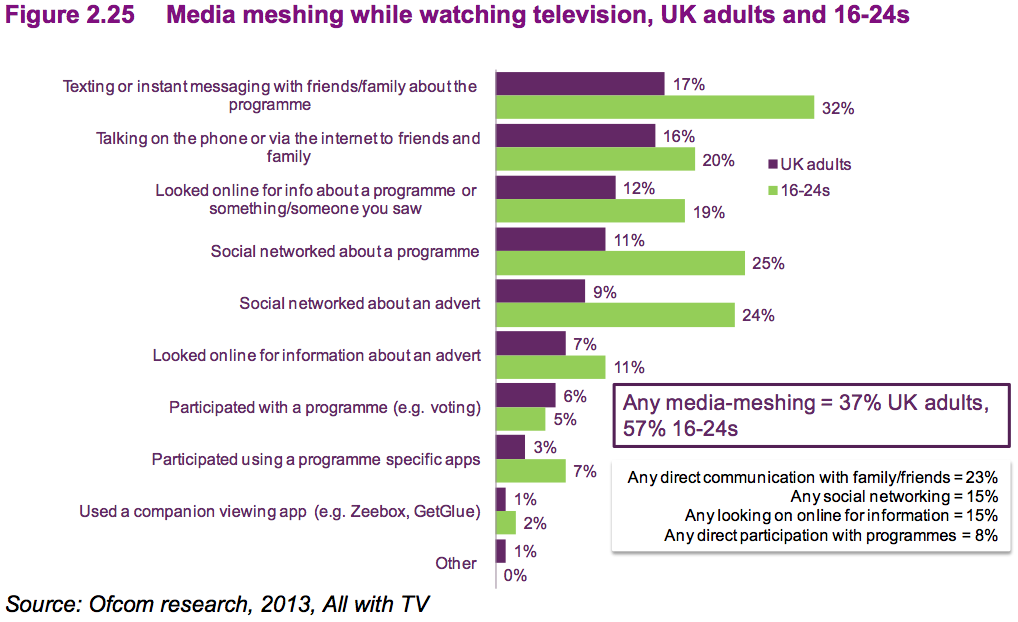We are getting more and more connnected


But almost more interesting are the trends which have turned around. Digital radio take-up has declined in recent years, MP3 player usage has flatlined, and mobile broadband is less used than it has ever been since Ofcom started tracking it. At least some of that is likely to be cannibalisation by smartphones, which can do all of that and more. And sure enough, “internet on mobile” is the fastest growing category on either of these tables.
No one wants to give up TV

When people are asked the one activity which they couldn’t give up, watching TV is still number one by a huge margin. But using mobiles is steadily becoming more and more of a necessity — and no wonder, because they can do almost all the rest and more.
Because we all watch it all the time

We’re actually spending more time in front of the TV than we did five years ago, and slightly less time using the internet on computers. We’ve doubled the amount of time on a mobile, but from such a tiny base, there’s a lot more to go.
Media “stacking” and media “meshing” are things



This is basically OFCOM splitting the commonly accepted definition of “second screening”—literally using a second screen while you watch TV—into two different things. Media meshing is doing something related to what you’re watching on telly, while media stacking is doing something completely different. Meshing is what the broadcasters want you to do, since it increases the value to advertisers and allows them to demonstrate how engaged you are with their content. Stacking is what you actually are doing, though. More than half of us have done something else while watching TV. Young people do both more, but the difference is stark when it comes to meshing.
Tablets get shared around

If you’re the only person who uses your tablet, you’re in the minority. Two thirds of them are used by someone else, normally partners or children.
You are weird



Only 32 per cent of the UK get their news from the internet. You—yes, you, dear reader—are an odd minority.
That said, this figure is self-reported, and it shows. The thought that 79 per cent of the country doesn’t “use” word of mouth for news is faintly ridiculous. So it may be the case that people actually do use websites for news, but just don’t think of it because it’s part of a larger process of general newsgathering.
Even so, it’s clear that TV rules the roost. And not even the rolling news channels, just good, old-fashioned BBC One. Remember that, next time you wonder why Ed Miliband is prepared to sound like a robot to get his talking point on the 6 O’clock News.
YouTube isn’t as popular as it seems

Slightly over half of Britain admitted to “regularly” viewing video clips. Again, it may be a reporting error, but it’s far lower than regular visitors of the New Statesman website may expect.
No-one uses their DVR

Two thirds of Britain has the ability to time-shift their viewing of TV, thanks to services like Sky+; but only a tenth of the country actually does it.
The five-channel model of TV is out of date


Almost every home now watches at least 15 minutes of TV on a channel other than the big five once a week, and nearly 50 per cent of our watching time is spent on these other channels. The big losers have been BBC One and ITV, which no longer command anywhere near the share they did in the 1980s.
Men like sports, women like “living”

BBC One is the channel with the best male/female balance, while some channels have an unusally gendered audience: News is blokey, apparently, while all the ITV channels except the deliberately male-focused ITV4 have strong female audiences.
A fun quirk, that CBBC apparently has a “younger” audience than Cbeebies, is probably due to the fact that parents are more likely to watch TV with their toddlers than with older children. That would also explain the gender balance for those channels, since stay-at-home parents are overwhelmingly women.
Spotify is boss

But there’s still room for more book clubs in the market, at least.
Rich people have more devices


Not particularly surprising, maybe; but there are a couple of quirks in the data. The most interesting is the flat graph for games consoles, which supports anecdotal evidence that these all-in-one entertainment boxes are a favourite of poorer families. The PS3, for instance, is also one of the cheapest internet-enabled devices on the market.
People who don’t have the internet don’t want the internet


A lot of ink is spilled on the “digital divide”—the damage caused by being offline in this day and age—but by far the most common reason given for not having the internet is a lack of interest. Just under a quarter can’t afford it, and at least eight per cent of them wouldn’t want one even if they could.
Amazon has taken ebay’s crown

Meanwhile, the legacy retailers are far less popular.
Texting is dying

Landlines got more expensive last year, even though we used them less


On average, we made fewer calls, but paid more for the whole thing. “NTS” calls refer to phone calls to 08 numbers.
The 18 month mobile phone contract is no more

In boosting us all onto 24 month contracts, the carriers get an extra six months of locking us into the stupidly high fees we invariably accept for the latest mobiles. Stupid us.
Spare a thought for poor Royal Mail


The surprising thing about this is how long it took. The internet’s been killing post for decades, yet we still sent well over twice the letters in 2007 as we do now. Well, unless you are under 35; then you’ve never used the post.





